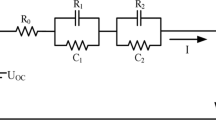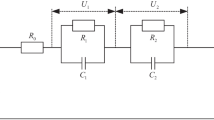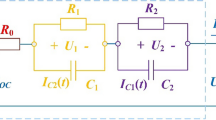Abstract
For a second-order battery circuit model, a modified multi-innovation adaptive extended Kalman filter (MMI-AEKF) algorithm is investigated to accurately estimate the state of charge (SOC). Firstly, a process/measure noise estimation based adaptive extended Kalman filter (EKF) algorithm is presented to adjust the statistical characteristics of noise online. Then, a multi-innovation extended Kalman filter (MI-AEKF) algorithm is studied by expanding the single innovation into an innovation vector containing present/past innovations to increase the input information. Furthermore, based on the exponential sequence principle, add the attenuation memory factors to weight all the present/past innovations to distinguish different influences. Finally, build the test bench to collect data of constant current experiment for parameter identification and data of the urban dynamometer driving schedule (UDDS) and Los Angeles 92 (LA-92) for algorithm validation. Simulation results show that the investigated algorithm has excellent accuracy and robustness in SOC estimation, and the RMSE is less than 0.1% under the reasonable parameters.














Similar content being viewed by others
References
Zubi G, Dufo-López R, Carvalho M, Pasaoglu G (2018) The lithium-ion battery: state of the art and future perspectives. Renew Sustain Energy Rev 89:292–308
Liu K, Li K, Peng Q, Zhang C (2019) A brief review on key technologies in the battery management system of electric vehicles. Front Mech Eng 14(1):47–64
Zhang Z, Guo T, Gao M, He Z, Dong Z (2021) Review of SOC estimation methods for electric vehicle Li-ion batteries. J Electron Inf Technol 43(7):1803–1815
Cui Z, Wang L, Li Q, Wang K (2022) A comprehensive review on the state of charge estimation for lithium-ion battery based on neural network. Int J Energy Res 46(5):5423–5440
Feng X, Chen J, Zhang Z, Miao S, Zhu Q (2021) State-of-charge estimation of lithium-ion battery based on clockwork recurrent neural network. Energy 236:121360
Li C, Xiao F, Fan Y, Tian X, Yang G (2021) Joint estimation of the state of charge and the state of health based on deep learning for lithium-ion batteries. Proceedings of the CSEE 41(2):681–692
Zhao X, Xuan D, Zhao K, Li Z (2020) Elman neural network using ant colony optimization algorithm for estimating of state of charge of lithium-ion battery. J Energy Storage 32:101789
Guo Y, Zhao Z, Huang L (2017) SOC estimation of lithium battery based on improved BP neural network. Energy Procedia 105:4153–4158
Hong J, Wang Z, Chen W, Wang L, Qu C (2020) Online joint-prediction of multi-forward-step battery SOC using LSTM neural networks and multiple linear regression for real-world electric vehicles. J Energy Storage 30:101459
Ma L, Hu C, Cheng F (2021) State of charge and state of energy estimation for lithium-ion batteries based on a long short-term memory neural network. J Energy Storage 37:102440
Chemali E, Kollmeyer JP, Preindl M, Emadi A (2018) State-of-charge estimation of Li-ion batteries using deep neural networks: a machine learning approach. J Power Sources 400:242–255
Qian C, Xu B, Chang L, Sun B, Feng Q, Yang D, Ren Y, Wang Z (2021) Convolutional neural network based capacity estimation using random segments of the charging curves for lithium-ion batteries. Energy 227:120333
Jiao M, Wang D (2021) The Savitzky-Golay filter based bidirectional long short-term memory network for SOC estimation. Int J Energy Res 45(13):19467–19480
Jiao M, Wang D, Qiu J (2020) A GRU-RNN based momentum optimized algorithm for SOC estimation. J Power Sources 459:228051
Jiao M, Wang D, Yang Y, Liu F (2021) More intelligent and robust estimation of battery state-of-charge with an improved regularized extreme learning machine. Eng Appl Artif Intell 104(2):104407
Jiao M, Yang Y, Wang D, Gong P (2021) The conjugate gradient optimized regularized extreme learning machine for estimating state of charge. Ionics 27(11):4839–4848
Bartlett A, Marcicki J, Onori S, Rizzoni G, Yang X, Miller T (2016) Electrochemical model-based state of charge and capacity estimation for a composite electrode lithium-ion battery. IEEE Trans Control Syst Technol 24(2):384–399
Lai X, Zheng Y, Sun T (2018) A comparative study of different equivalent circuit models for estimating state-of-charge of lithium-ion batteries. Electrochim Acta 259:566–577
Feng Y, Shen J, Ma Z, He Y (2021) Equivalent circuit modeling of sodium-ion batteries. J Energy Storage 43:103233
Du J, Liu Z, Wang Y, Wen C (2016) An adaptive sliding mode observer for lithium-ion battery state of charge and state of health estimation in electric vehicle. Control Eng Pract 54:81–90
Yao J, Ding J, Feng L (2021) Sliding mode based H-infinity filter for SOC estimation of lithium-ion batteries. Ionics 27(12):5147–5157
Lim K, Bastawrous H, Duong V, See K, Zhang P, Dou S (2016) Fading Kalman filter-based real-time state of charge estimation in LiFePO4 battery-powered electric vehicles. Appl Energy 169:40–48
Fang Y, Xiong R, Wang J (2018) Estimation of lithium-ion battery state of charge for electric vehicles based on dual extended Kalman filter. Energy Procedia 152:574–579
Lu L, Han X, Li J, Hua J, Ouyang M (2013) A review on the key issues for lithium-ion battery management in electric vehicles. J Power Sources 226:272–288
Meng J, Ricco M, Luo G, Swierczynski M, Stroe D, Stroe A, Teodorescu R (2018) An overview and comparison of online implementable SOC estimation methods for lithium-ion battery. IEEE Trans Ind Appl 54:1583–1591
Ling L, Sun D, Yu X, Huang R (2021) State of charge estimation of lithium-ion batteries based on the probabilistic fusion of two kinds of cubature Kalman filters. J Energy Storage 43:103070
Li Z, Zhang P, Wang Z, Song Q, Rong Y (2017) State of charge estimation for li-ion battery based on extended Kalman filter. Energy Procedia 105:3515–3520
Li W, Yang Y, Wang D (2020) The multi-innovation extended Kalman filter algorithm for battery SOC estimation. Ionics 26(12):6145–6156
Ye Y, Li Z, Lin J, Wang X (2022) State-of-charge estimation with adaptive extended Kalman filter and extended stochastic gradient algorithm for lithium-ion batteries. J Energy Storage 47:103611
Zhang Z, Jiang L, Zhang L, Huang C (2021) State-of-charge estimation of lithium-ion battery pack by using an adaptive extended Kalman filter for electric vehicles. J Energy Storage 37:102457
Hu C, Youn B, Chung J (2012) A multiscale framework with extended Kalman filter for lithium-ion battery SOC and capacity estimation. Appl Energy 92:694–704
He Z, Li Y, Sun Y, Zhao S, Lin C, Pan C, Wang L (2021) State-of-charge estimation of lithium ion batteries based on adaptive iterative extended Kalman filter. J Energy Storage 39:102593
Shi N, Chen Z, Niu M, He Z, Wang Y, Cui J (2022) State-of-charge estimation for the lithium-ion battery based on adaptive extended Kalman filter using improved parameter identification. J Energy Storage 45:103518
He H, Qin H, Sun X, Shui Y (2013) Comparison study on the battery SOC estimation with EKF and UKF algorithms. Energies 6:5088–5100
Lin X, Tang Y, Ren J, Wei Y (2021) State of charge estimation with the adaptive unscented Kalman filter based on an accurate equivalent circuit model. J Energy Storage 41:102840
Wang S, Fernandez C, Yu C, Fan Y, Cao W, Stroe D (2020) A novel charged state prediction method of the lithium ion battery packs based on the composite equivalent modeling and improved splice Kalman filtering algorithm. J Power Sources 471:228450
Zhang S, Guo X, Zhang X (2020) An improved adaptive unscented kalman filtering for state of charge online estimation of lithium-ion battery. J Energy Storage 32:101980
Arasaratnam I, Haykin S (2009) Cubature Kalman filters. IEEE Trans Autom Control 54(6):1254–1269
Zhang L, Yang H, Lu H, Zhang S, Cai H, Qian S (2014) Cubature Kalman filtering for relative spacecraft attitude and position estimation. Acta Astronaut 105:254–264
Peng J, Luo J, He H, Lu B (2019) An improved state of charge estimation method based on cubature Kalman filter for lithium-ion batteries. Appl Energy 253:113520
Ding F, Chen T (2007) Performance analysis of multi-innovation gradient type identification methods. Automatica 43(1):1–14
Ding F, Chen H, Li M (2007) Multi-innovation least squares identification methods based on the auxiliary model for MISO systems. Appl Math Comput 187(2):658–668
Zong T, Li J, Lu G (2021) Auxiliary model-based multi-innovation PSO identification for Wiener-Hammerstein systems with scarce measurements. Eng Appl Artif Intell 106:104470
Wang Y, Tang S, Gu X (2022) Parameter estimation for nonlinear Volterra systems by using the multi-innovation identification theory and tensor decomposition. J Franklin Inst 359(2):1782–1802
Fan Y, Liu X (2021) Data filtering-based multi-innovation forgetting gradient algorithms for input nonlinear FIR-MA systems with piecewise-linear characteristics. J Franklin Inst 358(18):9818–9840
Zhou Z, Wang D, Xu B (2021) A multi-innovation with forgetting factor based EKF-SLAM method for mobile robots. Assem Autom 41(1):71–78
Liu HB, Wang D (2017) Robust state estimation for wireless sensor networks with data-driven communication. Int J Robust Nonlinear Control 27:4622–4632
Liu HB, Wang D (2018) Stability and stabilisation of a class of networked dynamic systems. Int J Syst Sci 49(5):964–973
Zhao L, Liu Z, Ji G (2018) Lithium-ion battery state of charge estimation with model parameters adaptation using H∞ extended Kalman filter. Control Eng Pract 81:114–128
Funding
This work was supported by the National Natural Science Foundation of China under Grant 61873138.
Author information
Authors and Affiliations
Corresponding author
Additional information
Publisher's note
Springer Nature remains neutral with regard to jurisdictional claims in published maps and institutional affiliations.
Rights and permissions
About this article
Cite this article
Gu, T., Sheng, J., Fan, Q. et al. The modified multi-innovation adaptive EKF algorithm for identifying battery SOC. Ionics 28, 3877–3891 (2022). https://doi.org/10.1007/s11581-022-04603-6
Received:
Revised:
Accepted:
Published:
Issue Date:
DOI: https://doi.org/10.1007/s11581-022-04603-6




